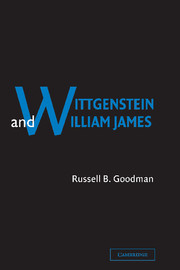Book contents
- Frontmatter
- Contents
- Preface
- Abbreviations
- Introduction
- 1 Varieties of Pragmatic Experience
- 2 Wittgenstein and The Varieties of Religious Experience
- 3 Wittgenstein and The Principles of Psychology: An Introduction
- 4 What Is It Like to Be a Human Being?
- 5 Language and Meaning
- 6 Pragmatism Reconsidered
- Coda
- Notes
- Index
Preface
Published online by Cambridge University Press: 23 July 2009
- Frontmatter
- Contents
- Preface
- Abbreviations
- Introduction
- 1 Varieties of Pragmatic Experience
- 2 Wittgenstein and The Varieties of Religious Experience
- 3 Wittgenstein and The Principles of Psychology: An Introduction
- 4 What Is It Like to Be a Human Being?
- 5 Language and Meaning
- 6 Pragmatism Reconsidered
- Coda
- Notes
- Index
Summary
I first began to think about James and Wittgenstein while working through the Wittgenstein Workbook published in 1970 by Christopher Coope, Peter Geach, Timothy Potts, and Roger White. Near the end of this slim but useful volume is a one-page list of parallel passages from James's The Principles of Psychology and Wittgenstein's Philosophical Investigations. Over the years, as I discussed the readings from this list in seminars, I learned to free myself from the view of the relationship between Wittgenstein and James that was enunciated by the authors of the Workbook – and many others. For according to this “received view,” James was important for Wittgenstein primarily because he committed, in a clear, exemplary manner, fundamental errors in the philosophy of mind. I found that although Wittgenstein did find such errors in The Principles of Psychology, he loved William James, both as a personality in his own writings and as a philosopher. I learned that The Principles and The Varieties of Religious Experience exerted a vast positive influence on Wittgenstein's philosophy, early and late.
In 1990, on a trip to Cambridge sponsored by the National Endowment for the Humanities, I discussed Wittgenstein and James with Geach and Elizabeth Anscombe, both of whom attended Wittgenstein's classes in the late 1940s. Wittgenstein considered using James's Principles as a text for these classes, and the published notes by his students, including Geach, show that it was a main object of study.
- Type
- Chapter
- Information
- Wittgenstein and William James , pp. viii - xPublisher: Cambridge University PressPrint publication year: 2002

